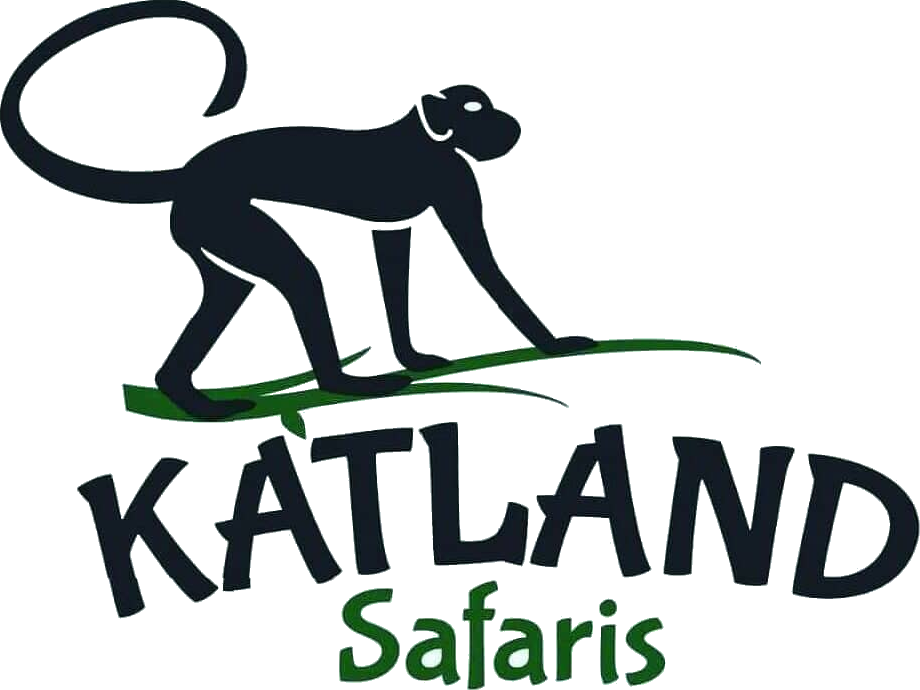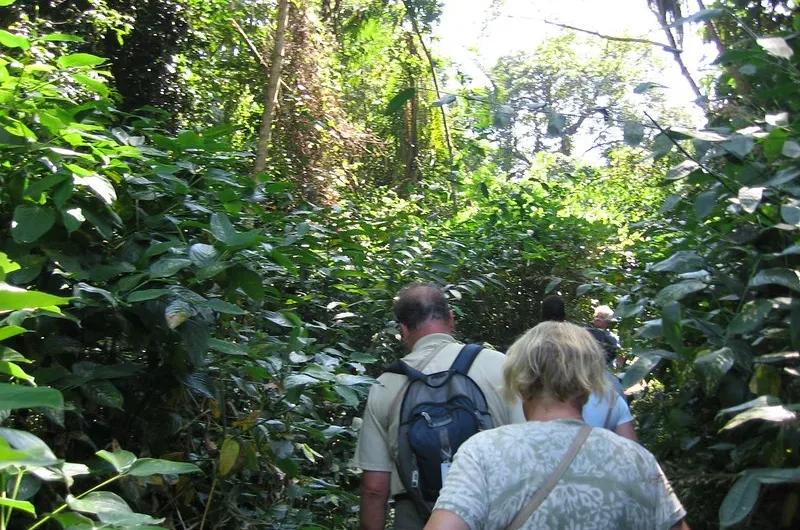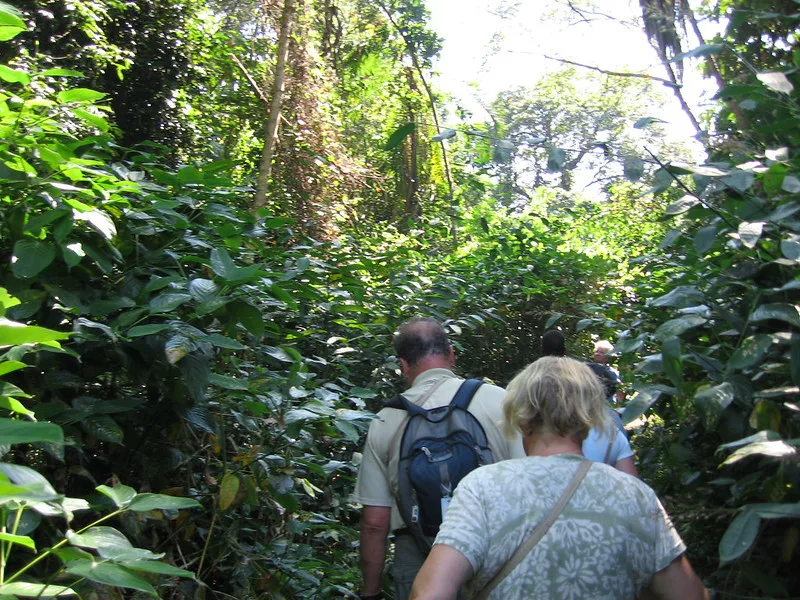Chimpanzee Trekking Discounts in Kibale National Park.
Coronavirus COVID-19 has caused significant and ever-changing problems for Uganda’s tourist industry, however when the virus has passed, chimpanzee trekking discounts in Kibale National Park are likely to be available. The majority of Uganda’s tourist revenue comes from small and medium-sized businesses, accounting for 80% of the industry.
This has had a devastating effect on millions of people’s ability to earn a living, including disadvantaged populations who rely on tourism as a means of economic inclusion. Despite being hit hard by pandemics and instability like Ebola in recent years, Uganda’s tourist industry has shown again and again that it can rebound and even spearhead the country’s economic and social revival.
Uganda has one of the lowest COVID-19 case counts among African countries, with no fatalities reported. This is largely attributable to the country’s well-preparedness to combat the pandemic, which has led to the implementation of stringent measures to combat the virus’s spread, such as encouraging citizens to remain at home, refrain from unnecessary travel, practice good hygiene, and maintain physical and social distance from infected areas.
Covid-19 and Ugandan Tourists
As in other nations throughout the world, the Corona COVID-19 pandemic has had a devastating effect on Uganda’s tourist industry, the country’s primary source of foreign currency, with operators in the field suffering heavy losses.
Statistics from the Ministry of Finance and the Ministry of Tourism, Wildlife, and Antiquities show that the tourism industry contributes 7.7 percent to GDP and $1.6 billion (or about Shs6 trillion) to export earnings in Uganda. However, the projected 10% increase will not be achievable because of the Corona Virus outbreak.
There will probably be post-COVID-19 chimpanzee trekking deals in Kibale, which is bad news for hotels, tour operators, and wildlife parks since a lot of international visitors and business travelers are putting off or canceling their trips to Uganda.
Located in the southwestern region of Uganda, near Rwenzori Mountain and Queen Elizabeth National Parks, lies Kibale Forest National Park. The Primate Capital of the World is Kibale Forest National Park, which is home to more major primates than any other park in Uganda, including the primate species chimpanzees.
For decades, the park has been named the top spot in the world to go primate trekking, especially chimpanzee trekking. A visit to this park is not complete without engaging in chimpanzee trekking, chimpanzee habituation, birdwatching, community walks, nature walks, research, and a host of other exciting activities.
Possible savings on chimpanzee hiking after the COVID-19 pandemic
Many businesses in Uganda’s tourist industry would likely cut prices on a variety of goods and services in an effort to recoup from the damage done by the coronavirus outbreak.
In an effort to recoup losses and remain competitive, tour companies will likely offer chimpanzee trekking packages to Kibale Forest National Park at significantly reduced prices. To trek chimpanzees in Kibale Forest National Park, you’ll need a chimpanzee permit, which costs $300 for non-residents of foreign countries, $250 for residents of foreign countries, and $30 for citizens of East Africa.
A local tour operator, such as Katland Safaris, can usually arrange for transportation, lodging, and other services, and they can probably offer you a good deal on all of these things. See above for tour options for chimpanzee trekking in Kibale Forest; our regular 3-day all-inclusive chimpanzee trekking to Kibale is $1000 for one person and $800 for two; post-COVID-19, this drops to $800 for one person and $800 for two.
Most visitors to Kibale Forest National Park utilize private transportation, often arranged and booked via a local tour operator, and it is probable that this mode of transportation will be less expensive after the coronavirus.
Some visitors choose to use public transit; link bus company is a big player along this route, and they will most likely provide discounts after COVID-19. Public transportation usually costs between 40,000 and 50,000 shillings, although that might drop to 25,000 to 30,000 shillings.
Some hotels, like the luxurious Kyaniga Lodge, have begun offering discounts, such as USD100 per person for African residents, in order to recover from losses and cancellations caused by the coronavirus pandemic. It is likely that other hotels and lodges in Kibale Forest National Park will also offer accommodation discounts.
One may find inexpensive, moderate, and opulent lodges in Kibale Forest National Park. Kibale Forest Camp, Turaco Treetops Lodge, Primate Lodge, and others in the mid-range cost between $100 and $300 per night, while Chimpanzee Forest Guest House, Isunga Lodge, and Kibale Homestay are among the more affordable options (90 to $100 per person per night).
The most luxurious lodges in the area, such as Ndali Lodge, Papaya Lake Lodge, and Kyaniga Lodge, charge between $300 and $400 a night per person. These establishments are sure to provide the finest deals for guests visiting Kibale Forest National Park.
The Containment of the COVID-19 Pandemic by Uganda Tourism
Because the Corona Virus is now a danger to Uganda’s travel trade and tourist assets, the Uganda tourist Board has published travel advice that we must adhere to throughout the post-outbreak period. Specifically, the board has recommended that:
The use of soap for handwashing is standard practice in all travel businesses, including tour operators, travel agencies, and lodging establishments.
It is advised that tour operators, agencies, and housing facilities have a supply of recommended masks (N95) for their customers in order to enhance sector-wide preparation.
It is highly suggested that all tour operators and travel firms remind their guests to bring their own masks (N95) while visiting Uganda.
Travel companies, tour organizers, and hotels all have a responsibility to inform their customers and employees on how to avoid getting Coronavirus.
Among these precautions are the following: not shaking hands or embracing one another; constantly washing hands with disinfectants; and routinely cleaning and sanitizing surfaces that are handled often, such door knobs.
Guidelines for safe chimpanzee hiking when the COVID-19 pandemic is over.
Follow these guidelines and recommendations set out by the World Health Organization if you’re planning to go chimpanzee trekking in Kibale Forest National Park, Uganda, after the coronavirus. For more information, visit https://www.unwto.org/tourism-covid-19. You will need a proof of travel demonstrating you do not have the virus, among others, and the most important ones are routinely washing your hands or using a hand sanitizer.
The following Chimpanzee Trekking Rules (as outlined in the printed pamphlet by the Uganda Wildlife Authority ‘Chimpanzee Rules’) must be followed during your visit to the chimpanzees in Kibale Forest National Park.
Prior to embarking on the chimpanzee trip in the aftermath of the COVID-19 pandemic
If you are sick with a cold or any other contagious disease, you should stay home from the chimpanzees. See your doctor to make sure you’re well enough to go on the Chimpanzee walk; the chief park ranger gets to decide and may turn you away if they don’t think you’re up to the challenge.
Presenting your proof of being COVID-19 free is mandatory.
At the time of registration for the chimpanzee trip, participants are needed to provide their original passport for verification, which confirms that they are at least 15 years old, the minimum age for tracking.
When you go on a hike, a park ranger will always dig a hole for you to bury your human waste in, and the recommended depth is 30 cm (15 inches).
To make it easier to regulate the chimpanzees’ movements in the forest and to prevent behavioral problems during the meeting, the maximum number of visitors per group is eight.
Reaching the Chimpanzees:
Please maintain a modest volume. You could even see some reptiles if you’re really lucky, as well as a wide variety of birds and other wild creatures.
Please do not discard any trash in the park. It is recommended that you return all items to your backpack before entering the jungle.
There will be spots to rest and times to unwind along the route.
The instructors will warn you to brace yourselves for an incredible encounter with the chimpanzees as you approach them.
While you’re in the company of chimpanzees:
Keep at least 7 meters (21 feet) away from the gorilla to prevent the spread of any airborne infections to the chimpanzees.
No eating, drinking, or smoking allowed. If you do this, the chimpanzees can become angry and try to attack you.
Chimpanzees are able to get human respiratory illnesses, therefore it’s best to cover your mouth and nose when you cough or sneeze to prevent spreading them.
Each chimpanzee group is only allowed one hour of visitation each day.
When shooting photographs, avoid using the flash. Be careful and listen to your ranger guide for further information.
After the COVID-19 pandemic, why should you choose Katland Safaris for your safari?
Safaris to Tanzania, Kenya, and the Democratic Republic of the Congo are now part of Katland’s offerings, which originally began in 2011 with incredible experiences in Rwanda and Uganda.
Our ability to curate unforgettable experiences is a product of the cohesive team we’ve built over the years, which includes both youthful and dynamic employees, as well as seasoned and dedicated directors and managers who are native Ugandans.
If you get in touch with us, we’ll have someone on staff who can help you get reliable information quickly. Safari reservations and TripAdvisor both give Katland Safaris great reviews and ratings.


